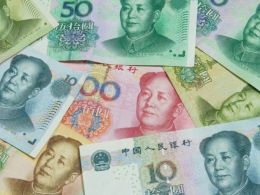
Chinese Government Will Scrutinize Even More Capital Outflows Moving Forward
This news will undoubtedly send more shockwaves throughout the Chinese economy moving forward. In an unsurprising turn of events, the Chinese government issued new guidelines to stem capital outflows. With the Yuan still going down a slippery slope, outbound investments are next on the chopping block. To be more precise, transfer abroad worth over US$5m are being vetted. Moreover, any international deals involving Chinese funds – even pre-approved deals – will face additional scrutiny, as China alienates itself from the rest of the world even more. The new guidelines issued by the State....
Related News
That said, the Chinese government wants to crack down on Bitcoin-related capital outflows. Bitcoin has always been of keen interest to the Chinese crowd. Most people in China see cryptocurrency as can investment vehicle and use it for high-frequency trading. But with the current economic turmoil in the country, Bitcoin is a way to circumvent capital controls. Singapore-based newspaper The Straits Times seems to agree with this sentiment, as they dedicated an entire article to Bitcoin. The Chinese government has to address many different problems at the same time. One of their biggest....
Unfortunately, the Chinese government is working on countermeasures. The current plan is to curb capital outflows, and they are paying close attention to the bullion market right now. It is evident the Chinese Yuan is not in a good place right now. Chinese investors are willing to exchange their Yuan for other assets, even if they have to pay a premium price to do so. Physical gold is of particular interest to them right now, despite the government looking to curb capital outflows. One could say Chinese investors find themselves in a gold-crazed scenario right now, and demand is surging at....
But there is more, as financial institutions will have to report international transfers exceeding 200,00 yuan. China has been imposing various degrees of curbing capital outflow throughout 2016. Not all of these attempts have been successful, but the government has come up with a new plan. Foreign currency purchases will be restricted even further moving forward. In doing so, the government aims to reduce the amount of money leaving the Chinese economy. Converting Yuan to foreign currency will become more difficult for everyone living in China. Additional information needs to be provided....
The latest PBOC report hints at China's reserved tumbling by another US$41.1bn in December 2016. This would effectively reduce the country's reserves to just above US$3tn, a very dangerous level. Financial experts all over the world are concerned over the situation in China. Country officials revealed the financial reserves, which sit as US$3tn right now. However, the PBOC reported over US$41bn in capital outflows affecting the Chinese economy in December 2016. These numbers do not seem to add up, and it appears the Chinese government is padding the reserve numbers. For quite some time....
A look at what increasing capital outflow from China suggests about bitcoin adoption, and what implications a Chinese slowdown might have for the bitcoin price going forward. At the end of last month, we learnt that Chinese capital outflows during 2015 totaled $676 billion net. The data marks only the third net capital outflow since the turn of the millennium, and by far the biggest, with the other two coming in at less than $140 million net (2012,2014). The outflow comes against a backdrop of wider economic weakness in China and emerging markets, and quantifiably highlights China’s....





